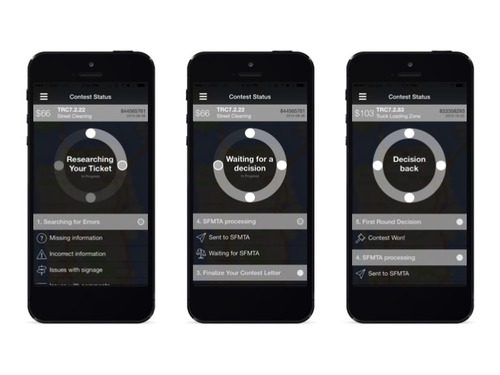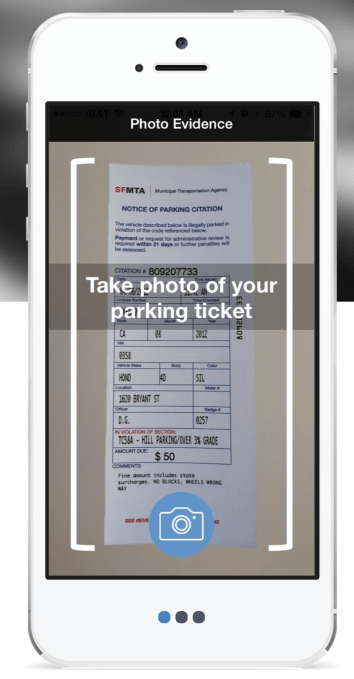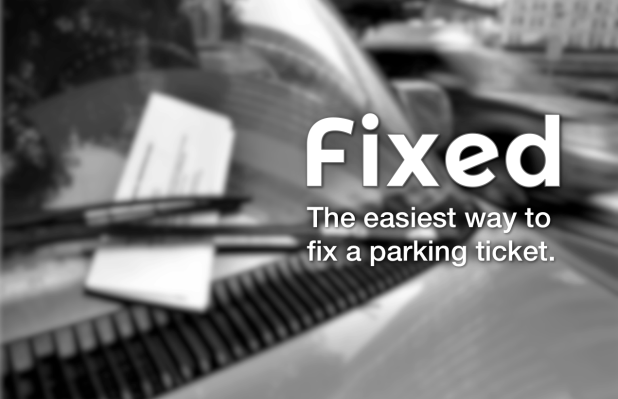Sometimes the government, not the startup, wins. Case in point: Fixed, the company that began as a tool to help drivers fight their parking tickets through the use technology, has been acquired. Fixed had struggled to get cities to accept its submissions, having faced everything from being blocked from cities’ ticket websites to agencies simply unplugging their fax machine so Fixed couldn’t reach them. In fact, the company had to shut down its parking ticket business last fall to focus on traffic citations instead, due to pushback from local government agencies and its lack of resources to fight back.
The idea for Fixed was ingenious. It automated users’ ability to contest parking tickets, just by having drivers snap a photo of their ticket with their smartphone camera. Then, Fixed’s mobile app would check for a variety of common errors and craft a customized letter to the city on the user’s behalf. It even tapped into Google Street View to see if the city had the proper signage in place in the area where the ticket was received.
And if the ticket was legit, Fixed could also help automate its payment so users could avoid the drudgery of having to use the city’s often outdated website.

But local government, which relies on parking fines to fill its coffers, didn’t care for an app whose aim was to help users get out of paying their fines. Thus, Fixed’s “win” rate was fairly low – around 20 to 30 percent of tickets it contested were adjusted to the user’s favor. (Fixed once claimed that the San Francisco Municipal Transportation Agency wouldn’t always dismiss tickets even when it found an issue that should have made the ticket invalid).
Fixed was eventually blocked in October 2015 in San Francisco, Oakland and L.A. even though it knew how to work around the blocks, it couldn’t do so due to the increase in engineering time and resources that would be required. That’s when it began to focus on traffic citations.
The company built a system that would analyze a traffic ticket, then help explain to the customer what the impact of that would be, financially. This was useful because most customers only think in terms of the fine amount, not the long-term damage due to the points that tickets added to your license and subsequent increases in insurance.
It could then connect customers with attorneys who could help, and at reduced rates because Fixed was automating a lot of the onboarding process for the law firms. It was working with some 20 attorneys in a dozen states.
This ended up attracting the attention of Lawgix, a multi-state law firm that’s actually part tech company. (The person running the tech side of the business, Eric Sonnier, also knew of Fixed due to having been in the same Y Combinator class).
 Fixed was processing around 500 tickets per week, and the lawyers it referred customers to could help with points removal in roughly 90 percent of cases. They also helped reduce fines about half the time.
Fixed was processing around 500 tickets per week, and the lawyers it referred customers to could help with points removal in roughly 90 percent of cases. They also helped reduce fines about half the time.
Lawgix had built technology systems for the backend of the litigation process – like those that handled court dates and processed the results of court actions. Now it will tack Fixed’s technology onto the front-end, to onboard new clients and expand the reach of Fixed’s app to 17 states.
The acquisition, however, is for the technology, not the talent. And while it’s good to know the tech will live on, it’s not really the sort of outcome Fixed founder David Hegarty desired.
Fixed was in the process of fundraising in September, but when the cities blocked the app, a new round was no longer an option. Though Uber has had some impact on investors previously skittish to fund services that take on current regulations, many are still cautious about getting into this sort of business.
And fighting regulations introduces another piece of friction to growing a startup, Hegarty says. “It’s hard enough to get a business up and running when it’s plain sailing,” he notes.
Plus, after pivoting to traffic tickets, Fixed then began to bump up against the Bar Association, too.
“We started rubbing up against the existing attorneys in that system, and they would file complaints to the Bar Association about us,” Hegarty says. “We had worked with an ethics attorney in L.A. to stay in compliance with all these rules and regulations, but it just became really hard. It was another stranglehold on the business,” he says.
Lawgix won’t deal with those same issues, as it won’t have to worry about things like putting in disclosures that the information Fixed offers isn’t “legal advice,” for example. People could no longer argue that Fixed’s help with tickets is like practicing law, and therefore is a problem. Lawgix is a law firm, which makes it okay. And being part tech company may make it a perfect fit for Fixed, too.
Fixed had raised $1.8 million in seed funding, including from Mark Cuban on Shark Tank, Dave Morin’s Slow Ventures, Structure VC, Paul Buchheit, rapper Nas, and others.
Hegarty declined to comment on deal terms.
